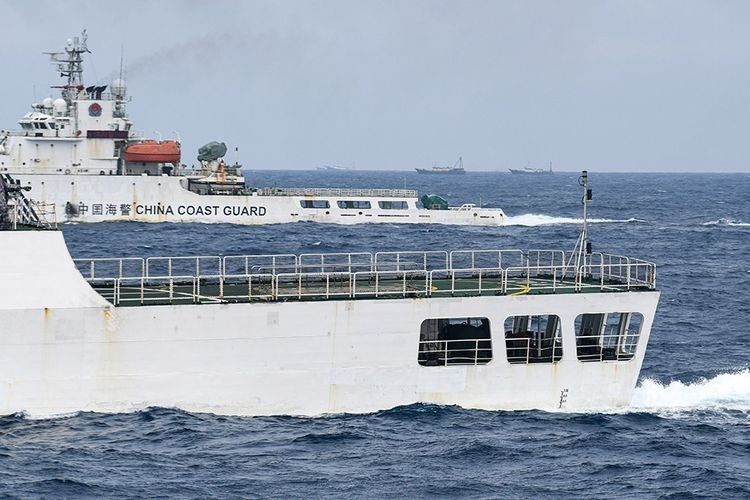Popular Reads
Top Results
Can't find what you're looking for?
View all search resultsPopular Reads
Top Results
Can't find what you're looking for?
View all search resultsHow free is the freedom of navigation, right to sail?
Indonesian Navy acted appropriately and lawfully in its recent response to a Chinese Coast Guard vessel spotted sailing in its waters off Natuna.
Change text size
Gift Premium Articles
to Anyone
T
he year 2022 concluded with a great achievement in the law of the sea, namely an agreement on an exclusive economic zone (EEZ) boundary between Indonesia and Vietnam. Unfortunately, while the international communities are celebrating it, the excitement has been tainted by the maneuvers of the China Coast Guard (CCG).
We, the Indonesia Ocean Justice Initiative, learned that the CCG 5901, the biggest ship of the CCG, was maneuvering in the North Natuna Sea close to the Tuna Block from Dec. 30, 2022 to Jan. 10, 2023. One could argue that this movement by the CCG was merely exercising its right to navigate freely in the EEZ of another state.
However, careful examination of the United Nations Convention on the Law of the Sea (UNCLOS) shows us a different line of argument.
UNCLOS stipulates that ship of all states enjoy the right to sail in the EEZ of another state.
However, it was never the drafters’ intention to place no limitations on this freedom of navigation.
First, navigation means sailing in a particular direction, not the right to sail back and forth and stop for no reason in the vicinity of a coastal state’s vital offshore project located within that state’s EEZ.
Legally speaking, it is true that unlike innocent passage and transit passage, UNCLOS is silent on the meaning of the freedom of navigation. In the absence of textual clarity, interpretations might come into play.
However, standing on this absence of clarity to justify the lawfulness of circling, unreasonable stopping or other kinds of maneuvers defeats the very foundation of this right. The essence of navigation, as defined by UNCLOS in the context of innocent passage and transit passage, is continuous and expeditious passage. Stopping and anchoring are allowed only in specific circumstances, for instance force majeure.
This arrangement was carefully developed in order to protect the interests of flag states and coastal states, a very noble objective of UNCLOS. The purpose and spirit of the freedom of navigation in the EEZ is no different.
Second, the drafters of UNCLOS were conscious that the problems of ocean space are closely interrelated and need to be considered as a whole. The phrase “closely interrelated” depicts the direct interaction of one party exercising a right with respect to the rights of another party. In this regard, UNCLOS stipulates the obligation of due regard as to ensure this interaction flows peacefully.
To put it simply, when a ship sails in the EEZ of a coastal state, it must be careful to avoid violating the sovereign rights of that state. The simplest manifestation of this carefulness is to not approach the coastal state’s areas of exploration or exploitation. If in doubt, the obligation of due regard requires the two parties to consult each other at the very least and find the best option for both.
Third, UNCLOS obliges its parties to exercise their rights in good faith. The phrase “good faith” is an overarching legal principle and is hard to define in absolute terms. Nonetheless, “good faith” can be understood as acting in a way that does not encroach the rights of another state, or acting reasonably and with consideration of the legitimate expectations of another state.
Thus, exercising a right for an end for which it was not intended, like what CCG 5901 did, is wrong, although it is arguably correct textually.
Sending multiple warships to the North Natuna Sea is a lawful and appropriate response from the Indonesian Navy. Irregular navigation by CCG 5901 indicates bad faith, which potentially violates the obligations of due regard and good faith governed by UNCLOS. It is unacceptable and must be stopped.
Predictably, China will again voice its unlawful and obsolete claim of its so-called nine-dash line. Whatever happens, Indonesia should not back down an inch in the face of CCG’s muscle flexing.
The EEZ agreement between Indonesia and Vietnam opens a pathway for both countries to cooperate in responding to the CCG. With a clear maritime boundary, Indonesia and Vietnam now have the time and energy to focus on patrolling the area. Strengthening the relationship between the Indonesian Coast Guard and Vietnamese Coast Guard in this regard is essential.
Additionally, it is equally important for the Indonesian government to explore strategic legal and diplomatic measures against China, particularly as regard the recent navigation of CCG 5901 in the North Natuna Sea.
***
The writer is cofounder and senior advisor of the Indonesia Ocean Justice Initiative.










